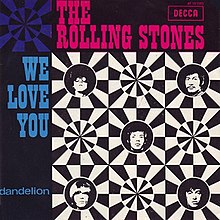| "We Love You" | ||||
|---|---|---|---|---|
 Dutch picture sleeve | ||||
| Single by the Rolling Stones | ||||
| A-side | "Dandelion" (US) | |||
| B-side | "Dandelion" (UK) | |||
| Released | ||||
| Recorded | 13, 21 June, 2 and 19 July 1967[1] | |||
| Studio | Olympic, London | |||
| Genre | ||||
| Length | 4:38 | |||
| Label | ||||
| Songwriter(s) | Jagger–Richards | |||
| Producer(s) | Andrew Loog Oldham | |||
| The Rolling Stones UK singles chronology | ||||
| ||||
| The Rolling Stones US singles chronology | ||||
| ||||
| Promotional film | ||||
| "We Love You" on YouTube | ||||
"We Love You" is a song by the English rock band the Rolling Stones that was written by Mick Jagger and Keith Richards. Their first new release of the summer of 1967, it was first released as a single on 18 August in the United Kingdom, with "Dandelion" as the B-side. The song peaked at number eight in Britain and number 50 in the United States, where "Dandelion" was promoted as the A-side and peaked at number 14.
Written as a message of gratitude to their fans for the public support towards them during the drug arrests of Jagger and Richards, the recording features guest backing vocals by John Lennon and Paul McCartney of the Beatles.[5][6] It is considered one of the Rolling Stones' most experimental songs, featuring sound effects, layers of vocal overdubs, and a prominent Mellotron part played by Brian Jones. The single's two tracks were the final new Stones recordings for which a production credit was given for band manager Andrew Loog Oldham. The recording sessions that produced "We Love You" and "Dandelion" represented Oldham's last work with the band before resigning as their producer over personal and professional conflicts with them.
Critics at the time of its release praised the song for its production and vocal and instrumental performances, while also noting its significance to the band's current status. However, some at the time viewed the song as somewhat overproduced. Retrospective reviews have been positive, with some describing its sound as too similar to the Beatles, and emblematic of the band losing its identity over the Summer of Love in favor of following trends. However, others praise the song as a unique offering to the genre of psychedelic music, and for its diverse range of musical influences.
- ^ a b Margotin & Guesdon 2016, p. 242.
- ^ Babiuk & Prevost 2013, p. 265.
- ^ Erlewine, Stephen Thomas. "Biography & History". AllMusic. Retrieved 29 June 2020.
- ^ Swanson, Dave (29 June 2022). "Top Songs of the Summer of Love". Ultimate Classic Rock. Retrieved 3 July 2022.
- ^ Banerjee, Subhajit (7 September 2009). "The Beatles: 20 things you did not know about the Fab Four". The Daily Telegraph. Retrieved 7 September 2009.
- ^ Castleman, Harry; Podrazik, Walter J. (1977). All Together Now: The First Complete Beatles Discography 1961–1975 (2nd ed.). New York City: Ballantine Books. p. 82. ISBN 0-345-25680-8.